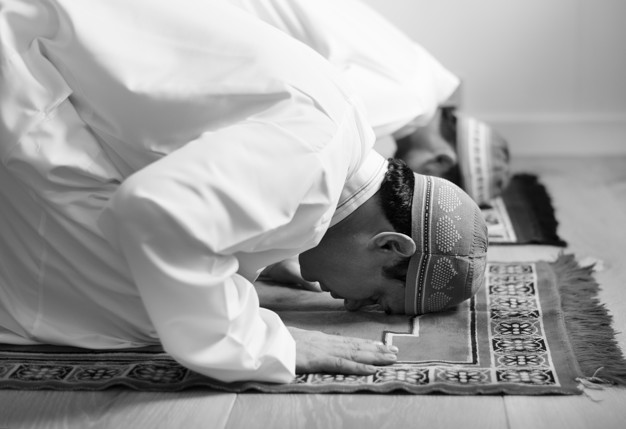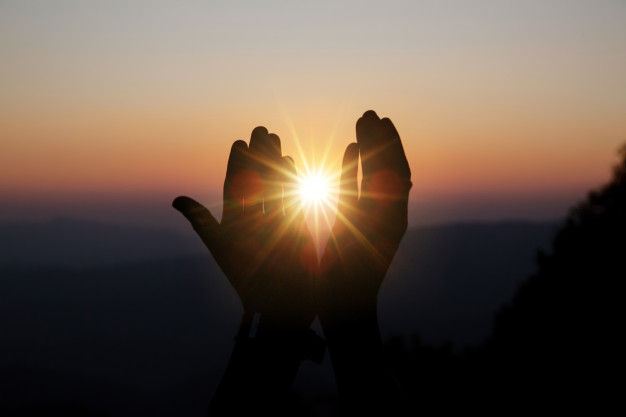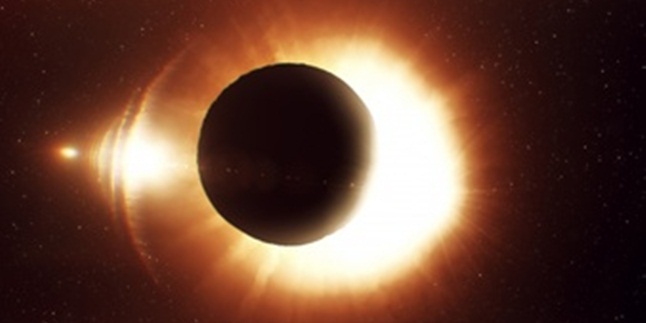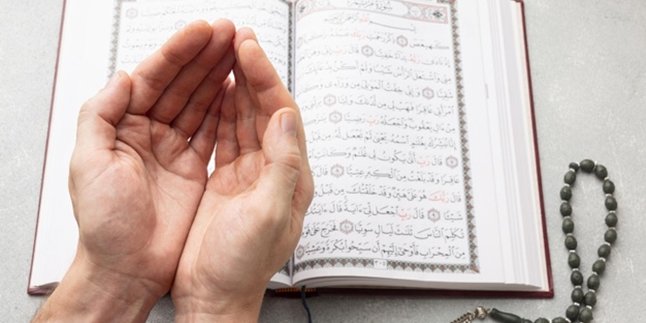Kapanlagi.com - Kusuf prayer is a worship performed during a solar eclipse. A solar eclipse is a phenomenon that occurs when the moon is positioned between the earth and the sun, causing it to partially or completely block the sunlight in the sky.
Now, this kusuf prayer is performed as a form of recognition of the greatness of Allah SWT for the occurrence of such natural phenomena. In addition to kusuf prayer, there is also khusuf prayer or lunar eclipse, which is also a natural phenomenon that shows the greatness of Allah SWT.
Kusuf prayer or sunnah prayer for a solar eclipse was first prescribed in the second year of the Hijri calendar, while the prayer for a lunar eclipse was prescribed in the fifth year of the Hijri calendar and according to the strong opinion (rajih), it is in the month of Jumadal Akhirah.
"The prayer for a solar eclipse was prescribed in the second year of the Hijri calendar, while the prayer for a lunar eclipse according to the strong opinion (rajih) was prescribed in the fifth year of the Hijri calendar in the month of Jumadal Akhirah," (See Ibrahim al-Baijuri, Hasyiyah al-Baijuri, Hasyiyatus Syeikh Ibrahim al-Baijuri, Indonesia, Darul Kutub al-Islamiyyah, 1428 H/2007 M, volume I, page 434).
If you want to understand more about this kusuf prayer, please refer to the following information compiled from various sources.
1. Law of Solar Eclipse Prayer

Illustration (Credit: Freepik)
To perform something believed to be an act of worship, it is better if you know the law regarding it, including the law of the eclipse prayer. Based on information from nu.or.id, the majority of scholars state that the law of performing eclipse prayers, whether solar eclipse (kusuf prayer) or lunar eclipse (khusuf prayer), is strongly recommended (sunah mu'akkadah). An explanation regarding this matter can be found in the following description.
"According to the consensus of scholars (ijma), the law of solar and lunar eclipse prayers is strongly recommended. However, according to Imam Malik and Abu Hanifah, lunar eclipse prayer is performed individually, two units like other voluntary prayers," (See Muhyiddin Syaraf An-Nawawi, Al-Majmu' Syarhul Muhadzdzab, Cairo, Darul Hadits, 1431 H/2010 M, volume VI, page 106).
This opinion is based on the words of Allah SWT and one of the hadiths of the Prophet Muhammad (SAW). Allah Almighty says,
"Among His signs are the night, the day, the sun, and the moon. Do not prostrate to the sun or to the moon, but prostrate to Allah, who created them, if it is Him you worship," (Surah Fussilat [41]: 37).
From this verse, it can also be understood that the kusuf prayer is performed based on the belief in the greatness of the Creator who created all phenomena, whether big or small, in the world.
2. Procedure for Performing Kusuf Prayer

Illustration (Credit: Freepik)
Based on the hadith of Prophet Muhammad (pbuh), you can understand how to comprehend the phenomenon of solar eclipse and how to behave during it.
"Indeed, solar and lunar eclipses do not occur due to the death or life of someone, but they are signs of the greatness of Allah. Therefore, when you see a solar or lunar eclipse, stand up and perform prayer." (Narrated by Bukhari and Muslim).
The command "stand up and perform prayer" can be understood as a command to acknowledge and understand the greatness of Allah by performing the kusuf prayer during a solar eclipse and the khusuf prayer during a lunar eclipse.
As for the procedure of performing kusuf prayer that you can follow:
1. Make sure that a lunar or solar eclipse is occurring first.
2. Perform the eclipse prayer while the eclipse is happening.
3. Before the prayer, the congregation can be reminded with the phrase, "As-Sholatu jami'ah."
4. Intend to perform the solar eclipse prayer (kusufus syams) or the lunar eclipse prayer (khusuful qamar), whether as an imam or a follower.
5. The eclipse prayer is performed for two rak'ahs.
6. Each rak'ah consists of two rukus and two prostrations.
7. After the first ruku of each rak'ah, recite Al-Fatihah and another surah.
8. In the first rak'ah, the recitation of the first surah is longer than the second surah. Similarly, in the second rak'ah, the recitation of the first surah is longer than the second surah.
9. After the prayer, it is recommended to give a sermon.
3. Recommendations for Performing Kusuf Prayer

Illustration (Credit: Freepik)
According to information from nu.or.id, there are several things to consider when performing kusuf prayer.
1. The first ruku in the first rak'ah is longer than the second ruku. According to the explanation in the Shafi'i school of jurisprudence, the tasbih recitation in the first ruku is approximately the same length as reciting one hundred verses of Surah Al-Baqarah, while the second ruku is approximately the same length as reciting eighty verses. This applies to the second rak'ah as well.
For the first ruku in the second rak'ah, the tasbih recitation is approximately the same length as reciting seventy verses of Surah Al-Baqarah, and the second ruku is approximately the same length as reciting fifty verses.
2. Regarding prostration, some say it is not necessary to be long. However, according to Muhammad az-Zuhri al-Ghamrawi, the correct opinion is that prostration should also be long. The answer regarding the length of prostration is that it is approximately the same as the length of ruku.
In other words, the first prostration in the first rak'ah is approximately the same length as reciting one hundred verses of Surah Al-Baqarah, and the second prostration is approximately the same length as reciting eighty verses. The first prostration in the second rakaat is approximately equal to reciting seventy verses of Surah Al-Baqarah, and the second prostration in the second rakaat is equal to reciting fifty verses.
In addition, the recitation of the Surah in the prayer of solar or lunar eclipse can be prolonged or shortened, but it is recommended to recite it slowly. There is no adhan (call to prayer) or iqamah (second call to prayer) in the eclipse prayer.
"The duration of glorification in the first bowing position is approximately equal to reciting one hundred verses from Surah Al-Baqarah, the second bowing position is eighty verses, the third bowing position is seventy verses, and the fourth bowing position is fifty verses. I believe that the correct opinion is to prolong the prostration as mentioned in the authentic hadith narrated by Bukhari and Muslim, and the opinion of Imam Shafi'i mentioned in the book Mukhtashar Al-Buwaithi that he prolonged the prostration just as he prolonged the bowing position before the prostration. And Allah knows best. Therefore, the first prostration is as long as the first bowing position, and so on. The prayer of solar eclipse is recommended to be performed in congregation and announced with the phrase ash-shalatu jami'ah. It is recommended to raise the voice when reciting the Surah in the prayer of lunar eclipse, not solar eclipse, and to slow down the recitation because the prayer of solar eclipse is a voluntary prayer performed during the day," (See Muhammad Az-Zuhri Al-Ghamrawi, As-Sirajul Wahhaj, Beirut, Darul Ma'rifah, n.d., 98).
3. After completing the prayer, it is followed by two sermons as in the Friday sermon. However, if the eclipse sunnah prayer is performed alone, there is no need for a sermon. The same goes if all the congregants are women. But if one of the women stands up to give a sermon, there is no problem (la ba'sa bih).
"Then the imam delivers the sermon or the person replacing the imam. The sermon is specifically for men who participate in the congregational prayer. Therefore, there is no sermon for those who pray alone or for female congregants. However, if one of the female congregants stands up and gives a sermon, it is permissible as in the 'Eid sermon," (See Ibrahim Al-Baijuri, Hasyiyatus Syeikh Ibrahim Al-Baijuri, Indonesia, Darul Kutub Al-Islamiyyah, 1428 H/2007 M, volume I, page 438).
4. In the solar eclipse phenomenon that occurred on June 21, 2020, as reported by liputan6.com, Kamaruddin Amin, the Director General of Islamic Guidance at the Ministry of Religious Affairs, recommended that the public recite takbeer, increase remembrance of Allah (zikir), seek forgiveness (istighfar), give charity (sedekah), and perform other virtuous deeds.
"After the prayer, the imam then delivers a sermon to the congregants, which contains exhortations to remember Allah, pray, seek forgiveness, give charity, and other good deeds," said Kamaruddin.
Because the solar eclipse occurred during the COVID pandemic, Kamaruddin also urged people to pray for the pandemic to end soon.
"Don't forget to pray for the COVID-19 epidemic to end soon and also pray for the safety of the nation and the state," he added.
That is the explanation regarding the rulings, procedures, and recommendations for the eclipse prayer. Hopefully it can be understood and get enlightenment.
(kpl/ans)
Disclaimer: This translation from Bahasa Indonesia to English has been generated by Artificial Intelligence.















